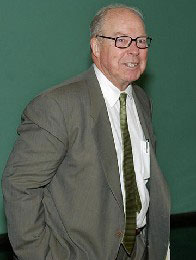The Bush administration, which accused Blix of hindering its drive for international support for the war, has sent its own teams to Iraq to search for illegal weapons. "We see no immediate role for Dr. Blix and his inspection teams," Richard Grenell, spokesman for U.S. Ambassador John Negroponte, said Monday. Blix stressed the council resolutions that call for U.N. inspectors to have access to all sites and people in Iraq. "We may not be the only ones in the world who have credibility, but I think we do have credibility for being objective and independent," he said. In an interview with BBC radio aired Tuesday, Blix said that before the war, the U.S. and Britain appeared to have used "shaky" intelligence, including forged documents, in an effort to prove Iraq had banned weapons. Blix said it was "very, very disturbing" that U.S. intelligence failed to identify as fakes documents suggesting Iraq tried to buy uranium from the West African nation of Niger. He also said U.S. officials tried to undermine his inspection team by telling the media that he withheld information about an Iraqi drone from the Security Council. "They felt that stories about these things would be useful to have and they let it out," he said. "It was not the case. It was a bit unfair and hurt us." U.N. inspectors went back to Iraq for the first time in four years in November and discovered no weapons of mass destruction during 3 1/2 months of searching. Secretary-General Kofi Annan ordered all U.N. international staff, including the inspectors, to leave Iraq just before the war began on March 20. He has said he expects them to return. Annan also said Tuesday in Austria that Iraqis should be in charge of their own future and natural resources. He acknowledged that "the U.N. is being challenged" but said he expected an agreement on the U.N. role in Iraq in the "not too distant future." Russian Ambassador Sergey Lavrov said Tuesday all council nations want assurance that there are no weapons of mass destruction in Iraq "and the only way to verify is to have (U.N.) inspectors in Iraq to see for themselves and to report back to the Security Council." "As soon as they deliver the report, the sanctions could be lifted, I'm sure," he said. France's U.N. ambassador, Jean-Marc de La Sabliere, said the council "must take into account the new realities on the ground" and take "a very pragmatic approach" to combine the work of the American teams and the U.N. inspectors. "I think it's doable," he said. "I hope it's doable."
|
